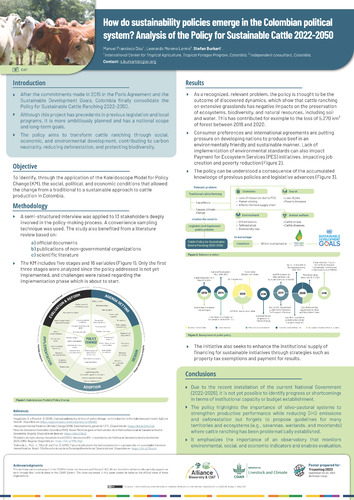How do sustainability policies emerge in the Colombian political system? Analysis of the Policy for Sustainable Cattle 2022-2050
Global projections for the agricultural sector indicate that environmental indicators like deforestation, loss of biodiversity, and greenhouse gas emissions will continue to rise for the period of 2018–2030, with livestock accounting for more than 80% of this increase. This has prompted the response of various governments, which have committed to taking mitigation measures. The Policy for Sustainable Cattle 2022-2050 in Colombia is one of the most ambitious efforts to support the pledges by encouraging the switch from conventional cattle farming to sustainable production systems and value chains. To serve as a catalyst for events that will allow policy makers to promote sustainability in similar contexts, this study attempts to use the Kaleidoscope Model of Policy Change to identify the exogenous and endogenous political system factors that facilitated the path towards the consolidation of the policy. Two qualitative methods were used to apply the framework: semi-structured key informant interviews and an extensive literature review to broaden the context provided by the experts. The main emphasis was placed on the first three stages of the model, namely a) Agenda Setting, b) Design, and c) Adoption. The results reveal that sustainability policies emerge in the political system not as isolated initiatives promoted by independent agents but through a series of events and synergistic agents that coordinate activities towards that purpose. Policies are a consequence of a set of factors where no single factor explains the change. Instead, change is the result of the accumulation and interaction of internal and external demands, political will, local policies, laws, and knowledge. In addition, although no clear veto players were identified, sustainability policies are at risk when the design is funded by international aid and the internal actors in charge of funding during the implementation phase are not specified. Conclusions highlight the importance of an observatory to analyze environmental, social, and economic indicators, as well as the implementation of new tax instruments (e.g., carbon taxes) to avoid strong dependence on international institutions.

